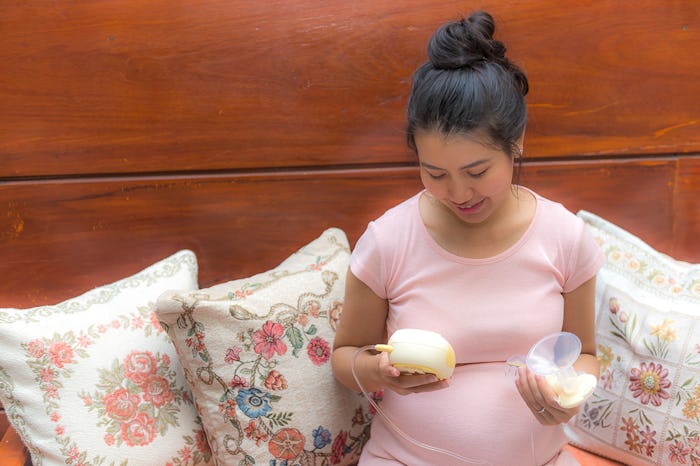Life

This Is How A Breast Pump Actually Helps Induce Labor, According To Science
I've heard it said that the discomforts and indignities of the third trimester are nature's way of preparing pregnant women to give birth. Whereas in the first two trimesters you may have worried about labor pain and potential complications, now you can't see any further than your swollen ankles. Bring on the contractions, you think, because that's got to be easier than peeing every 10 minutes. But how to bring on the contractions is a topic of great debate, from the properties of chugging pineapple juice to the question, does using a breast pump to induce labor really work? WebMD pointed out that while belief in these "folk remedies" is prevalent, "there is little scientific evidence to support any of them."
Nipple stimulation, which is what a breast pump does, however, is included in the "biologically plausible" category. Just how plausible is it that using a breast pump to induce labor will work?
Let's start with the biological reason for using a breast pump to induce labor. A breast pump stimulates your nipples, triggering the release of oxytocin, according to the Indian Journal of Endocrinology and Metabolism. If you haven't heard a lot about this hormone already, you will soon. Oxytocin, sometimes called the love or bonding hormone, helps you bond with your baby. It may also be a cause of contractions during labor. That's why oxytocin is "the preferred pharmacologic agent" for medical induction of labor, according to a 2003 study on labor induction methods. You may have heard of its synthetic version, Pitocin, which is frequently given to induce labor and get contractions going.
So does stimulating your nipples with a breast pump work? One company has patented a "nipple stimulation device" that looks a lot like a breast pump. According to the patent, this device stimulates contractions and labor by producing oxytocin through nipple stimulation. And a 2005 study found nipple stimulation to be "beneficial in relation to the number of women not in labor after 72 hours."
Basically? The science is there for a breast pump to really induce labor (and perhaps get a jump start on your milk supply.) But you should talk to your doctor before you try nipple stimulation at home. Research obviously indicates that it can help to induce or shorten labor, so if you have a breast pump at home and your doctor gives you the green light, why not try? Trust me, your body's about to go through a lot more uncomfortable things than a pumping session.